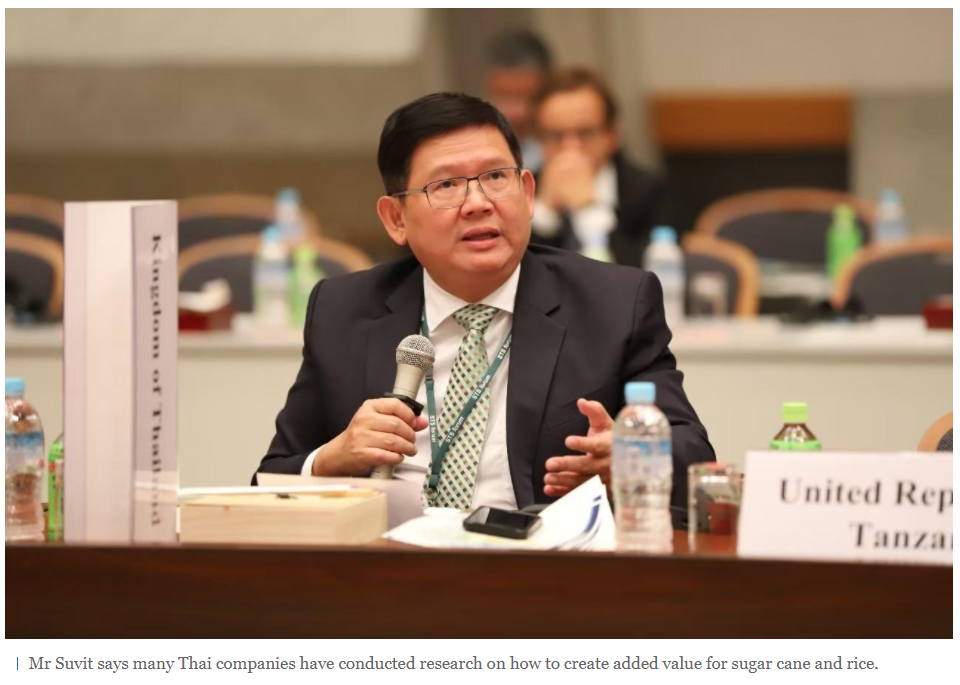Thailand: BCG model touted as solution for ailing economy
The bio-, circular and green (BCG) economy is likely the best model in the short term to revitalise a Thai economy battered by Covid-19 outbreaks, says Suvit Maesincee, the former higher education, science, research and innovation minister.
Based on Thailand’s strengths in agriculture, its rich natural resources, diversity and physical geography, BCG is the best model to rehabilitate the Thai economy in the short term, said Mr Suvit.
The model aims to create inclusive growth in Thai society, he said.
“BCG development covers not only the grassroots economy, but also community businesses, small and medium-sized enterprises, large businesses, startups and smart farmers,” said Mr Suvit, one of the architects of the Thailand 4.0 national strategy focused on added value, high technology and innovation. “BCG can also create development links from local to global, as well as align with the UN Sustainable Development Goals.”
He said Thailand’s BCG development should focus on five sectors: food, healthcare, sustainable energy, tourism and the creative economy.
BCG development ranges from local tourism promotion to calls for support from large businesses to use more domestic raw materials, as well as produce more domestic R&D and locally skilled personnel without awaiting foreign investment, said Mr Suvit.
“The economic model can improve security in terms of health, food supply, energy, income generation and job creation,” he said.
Mr Suvit listed four reasons for the government to promote BCG.
The first reason is BCG is the only S-curve sector to retain high competitiveness given the nation’s rich natural resources and diversity of biological resources. Its development could be based on Thailand’s bountiful domestic raw materials without waiting for foreign investment or technology, unlike electric vehicles, robotics or aviation, he said.
Mr Suvit said many Thai companies already conducted research on how to create added value from sugar cane and rice.
The government should support a fund to help community businesses and startups upgrade their business because it can create value for other farm products such as tapioca, palm seeds and fruit, he said.
“Many communities have successfully developed businesses from Thai herbs and fruit, such as cosmetics from mangosteen and medicine from herbs,” said Mr Suvit. “Those small businesses need the full support of the government to upgrade their quality standards and ensure better access to export markets.”
Community tourism that offers homestays at farms and promotes local culture should be seriously developed and promoted because it can create jobs and generate income quickly once the pandemic is controlled, he said.
The second compelling reason for BCG is Thailand can ramp up food exports after the pandemic eases because climate change is expected to bring about food, energy and water shortages, said Mr Suvit.
If the government developed irrigation to cover the farm sector nationwide, with better water management, Thailand could supply more food to the world and generate more income for people in remote areas, he said.
BCG should also be able to narrow income disparities, said Mr Suvit. There are 18 clusters of BCG that can be developed in each region.
The final reason is the government should include BCG development in global forums such as the Asia-Pacific Economic Cooperation, which Thailand is scheduled to host next year, as well as other economic cooperation frameworks, he said.
Mr Suvit described Thailand’s current BCG development structure as impractical and said it may fail to boost the economy in the short and medium term.
Prime Minister Prayut Chan-o-cha established two committees in October 2020 to handle BCG development: the BCG economy development committee and a management committee to drive the BCG economy, both chaired by the premier.
The first meeting of the latter in January approved a five-year strategic plan to promote the BCG economy, spanning 2021 to 2026. The government agreed to place the BCG economic model on the national agenda to speed up development because it could increase the value of farm products and the initiative as a whole is part of a global development trend.
Nine subcommittees were esta- blished to drive the country’s BCG development.
The second meeting, on July 13, approved an action plan for BCG strategic development spanning 2021 to 2027.
However, Mr Suvit proposed the prime minister establish small teams to drive BCG development under his direct supervision. The small teams should set the development agenda and make proposals to the national BCG strategy committee, he said.
The National Economic and Social Development Council and Foreign Ministry should act as co-secretaries to the national BCG strategy committee, said Mr Suvit. The nine subcommittees should be cut to four working committees on food, healthcare, sustainable energy, and tourism and the creative economy, he said.
Source: https://www.bangkokpost.com/business/2164027/bcg-model-touted-as-solution-for-ailing-economy


 English
English




